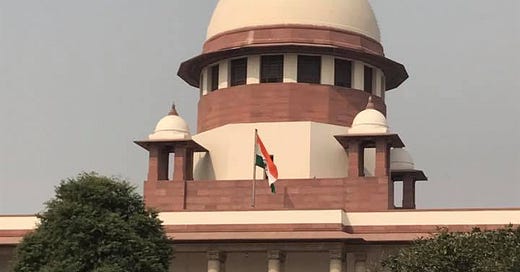Supreme Court Upholds Transfer of Behbal Kalan Firing Case to Chandigarh from Faridkot: Will Kotkapura Trial be Next?
Five Procedural Suggestions for Justice.
A Pivotal Judicial Turning Point
On 17 April 2025, the Supreme Court of India dismissed the Punjab Government’s plea against the transfer of the Behbal Kalan police firing case to Chandigarh from Faridkot. In doing so, it upheld the Punjab and Haryana High Court’s 31 May 2024 order and delivered a major legal and symbolic victory in a decade-long struggle for accountability. More than a mere procedural ruling, the verdict strengthens the call for judicial independence and sets a powerful precedent for the Kotkapura firing case, which remains entangled in delays. It also reignites the prospect of long-overdue justice for the families affected by the 2015 incidents of sacrilege and police violence in Punjab.
The Tragedies of October 2015: From Bargari to Behbal Kalan and Kotkapura
The Desecration and Protests
The events of 2015 were triggered by a grievous act of sacrilege. On 12 October 2015, torn pages of the Sri Guru Granth Sahib Ji were discovered near the gurdwara in Bargari village, Faridkot district. This followed the earlier theft of a saroop (copy) of the holy scripture from Jawahar Singh Wala village in June 2015. Public outrage soon erupted across Punjab, culminating in mass protests that intensified by mid-October.
On 14 October 2015, peaceful protestors gathered at Behbal Kalan and Kotkapura, demanding action against the culprits and accountability from the state machinery. Police opened fire at both locations:
Behbal Kalan: Two protestors, Gurjeet Singh and Krishan Bhagwan Singh, were shot dead. Several others sustained injuries.
Kotkapura: Though there were no fatalities, many demonstrators were injured, including Ajit Singh, who was shot in the thigh.
Delayed FIRs and allegations of cover-ups characterised the state’s initial response. The tide began to turn in 2018 when a Special Investigation Team (SIT), under ADGP L.K. Yadav, was constituted by the newly elected Congress government. In 2023, the SIT filed a comprehensive charge sheet naming prominent figures such as former Deputy CM Sukhbir Singh Badal, ex-DGP Sumedh Singh Saini, and senior police officers including Paramraj Singh Umranangal, Amar Singh Chahal, and Charanjit Sharma.
Legal Obstacles: Transfers, Stays, and Delays
Behbal Kalan: Transfer to Chandigarh Affirmed
In May 2024, citing threats to security and concerns of influence, the Punjab and Haryana High Court ordered the Behbal Kalan trial to be moved from Faridkot to Chandigarh. The Supreme Court’s recent affirmation of this order stressed the importance of safeguarding judicial neutrality and preventing external interference.
Kotkapura Case: Caught in Procedural Limbo
Despite its close linkage with Behbal Kalan, the Kotkapura firing case remains stalled. After resuming briefly in February 2025 following an eight-month hiatus, proceedings were again stayed by the Punjab and Haryana High Court, presumably on account of the pending litigation in the Supreme Court. Earlier, the Faridkot sessions court had itself recommended transferring the case to Chandigarh, recognising its legal and evidentiary overlap with Behbal Kalan. However, the High Court is yet to make a final determination, which decision is now almost inevitable, given the latest verdict of the Apex Court.
Supreme Court's Ruling: A Template for Kotkapura?
The Apex Court’s decision now stands as a binding precedent under Article 141 of the Indian Constitution. In February 2025, the presiding Justice of Punjab and Haryana High Court had observed that the same rationale underpinning the Behbal Kalan transfer also applied to Kotkapura. This gains renewed relevance and vigour in light of the Supreme Court’s verdict. Moreover, the High Court’s August 2022 directive for synchronised trials further strengthens the case for unified judicial handling of both matters.
Strategic Path Forward: Five Procedural Suggestions for Justice
To convert this legal momentum into actual justice, Punjab’s institutions must act decisively. The following reforms are both necessary and urgent:
1. Court-Appointed Public Prosecutor
A senior, independent advocate should be appointed as public prosecutor under Section 24(8) of the CrPC. Free from the influence of both the Punjab prosecution and the Chandigarh UT administration, this advocate should have full autonomy, with mandated support from both authorities.
2. Synchronised Judicial Oversight
Assigning both trials to a single Additional Sessions Judge in Chandigarh would ensure coherence in legal proceedings. Witnesses common to both cases would give testimony under consistent scrutiny, reducing duplication and potential contradictions.
3. Time-Bound Trials with Daily Hearings
In line with P. Ramachandra Rao v. State of Karnataka (2002), the High Court should implement a strict six-month trial framework, with daily hearings. This adheres to the Supreme Court’s precedent on speedy trials and echoes the recommendations of the 2019 National Policy on Court Management.
4. Protection of Witnesses and the Accused
Given reports of intimidation, a witness protection programme must be instituted. Similarly, enhanced security for the accused—including political and police figures—must be ensured to safeguard procedural fairness and secure court attendance.
5. Media Regulation During Trial
In accordance with the Sahara v. SEBI (2012) ruling and the Contempt of Courts Act, 1971, the High Court should restrict media speculation. Only authorised court transcripts and factual reporting should be permitted to avoid prejudicing the trial.
Summing Up: Towards Justice and Reconciliation
The Supreme Court’s affirmation of the Behbal Kalan case transfer represents a pivotal step towards restoring faith in the rule of law in Punjab. The Kotkapura case, logically and legally interwoven with Behbal Kalan, must now follow suit.
For a state still grappling with the legacy of the 1984 anti-Sikh pogroms and years of insurgency, justice in these cases offers more than legal closure—it is a moral and societal necessity. As Chief Justice D.Y. Chandrachud declared in Kaushal Kishor v. State of Uttar Pradesh (2023), “The courtroom must become a sanctuary for the marginalised, not a theatre for the powerful.”
It is time for the judicial courts to embody that sanctuary—and for justice to no longer be deferred.




